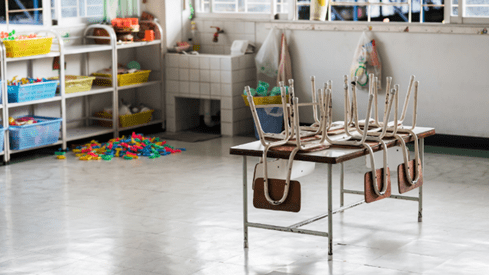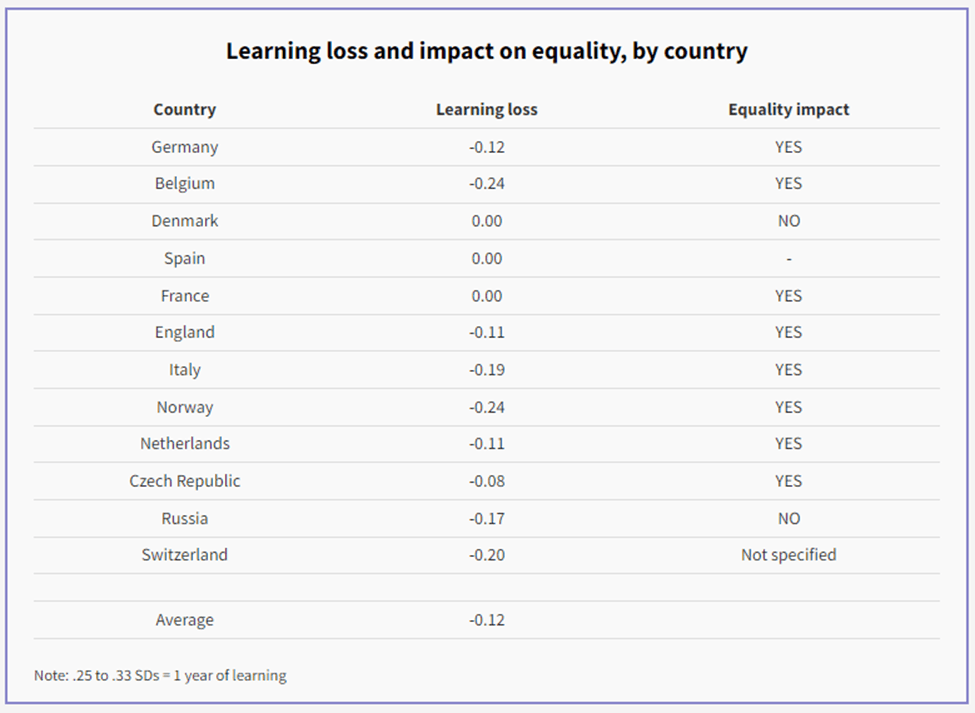Alina Sava’s intervention on the Digi24 TV news channel in Romania speaks about the Early Warning Mechanism, the Learning Plan, and how important it is to measure learning loss. Watch here.
The COVID-19 slide in education: new data on learning loss (News and Research 275)

COVID-19 led to school closures throughout Europe. Early evidence is showing that the pandemic is resulting in learning losses. At its peak, the pandemic led countries in the region to close their schools. Given the abruptness of the situation, teachers and administrations were unprepared for this transition and were forced to build emergency remote learning systems. To reduce and reverse the long-term negative effects, countries need to implement learning recovery programs, protect educational budgets, and prepare for future shocks by building back better. However, we need to assess learning losses from more countries.
COVID-19 led to school closures throughout Europe. Early evidence is showing that the pandemic is resulting in learning losses. At its peak, the pandemic led countries in the region to close their schools. Given the abruptness of the situation, teachers and administrations were unprepared for this transition and were forced to build emergency remote learning systems. To reduce and reverse the long-term negative effects, countries need to implement learning recovery programs, protect educational budgets, and prepare for future shocks by building back better. However, we need to assess learning losses from more countries.
So far, we have evidence of actual learning losses from only a handful of countries across Europe. Early results from Belgium, the Czech Republic, Germany, the Netherlands, Norway, Russia, Switzerland, and the United Kingdom have shown both learning losses. These losses are found to be much higher among students from less-educated homes.

In general, there is learning loss. As a result of the first wave of lockdowns and school closures beginning in March 2020, on average, a student in Europe has lost about a half years’ worth of learning. This has consequences in terms of further education as the lost learning may impact opportunities for higher levels of schooling. There are also long-term future earnings losses associated with lost human capital, with students potentially losing trillions of dollars in future incomes.
But there are also bright spots. Learning loss evidence is mixed in France, with on average very low levels of learning loss experienced thus far, though are still equity effects with more disadvantaged students suffering more. However, no learning loss is evidence in Denmark and no equity effect. It seems that Danish children received good home support and their reading behavior increased significantly because of the lockdown of schools.
Southern Europe
In other parts of Europe, there is still very little information on actual learning loss. In Southern Europe, for example, we have information of learning loss in schools and universities in Italy and evidence of no learning loss in Spain (but for only one faculty of one university). In Italy, the math skills of primary school pupils deteriorated rapidly due to the school closures which lasted about 15 weeks. The pandemic had a large negative impact on pupils’ performance, lowering math scores by 0.19 standard deviations – equivalent to more than a half year of schooling. Among the children of less-educated parents, the learning loss was larger, more than a full year’s worth of learning loss for the top performers.
Policy Response
These learning losses may translate into even greater long-term challenges, such as declines in employment and lower earnings for people, and of lower growth and higher poverty rates for countries. Addressing these challenges requires, data on actual learning losses, and then learning recovery strategies that address those losses.
The following policy responses may prove useful:
1. Implement learning recovery programs. Most immediately, governments must ensure that students who have fallen behind receive the support that they need to catch up to expected learning targets. The first step must be to carry out just-in-time assessments to identify these students and their support needs. Research has shown that 12-week programs of tutoring can result in students making the kind of progress that would be expected from three to five months of normal schooling. In Italy, middle school students who received 3-6 hours of free online tutoring a week via a computer, tablet, or smartphone, experience earnings gains of 0.26 standard deviations (roughly the equivalent of a year’s worth of learning).
2. Protect the education budget. Any decrease in government spending on education may jeopardize the gains that have been made in recent years in terms of access to education and improved learning outcomes. It is important that the education budget is protected and that schools that need financing the most are supported.
3. Prepare for future shocks. It is not only important to recover from the pandemic but also to use this experience to become better prepared for future crises. To support this, countries need to build their capacity to provide virtual education in the future. It will be necessary to develop flexible curricula that can be taught in person or online.
Most importantly, before doing any of these things, measure learning outcomes. There are 44 countries in Europe; yet there is learning loss data only for 12!
Originally published in Iniciativa Educacao on December 15, 2021 The COVID-19 slide in education: new data on learning loss by Harry Patrinos. In Portuguese as: O impacto da covid-19 na educação: Novos dados sobre as perdas de aprendizagem
*********
| How education can help mitigate the consequences of the COVID-19 pandemic Annual joint Summer School on the role of education in social and economic development HSE University and World Bank June 14 – June 21, 2022 Application Deadline: May 1, 2022 Price: participation is free Moscow, HSE Institute of Education Language: English Accommodation: organized and paid for by the participants themselves Lecture topics: The problems of inequality and access to education under COVID-19 Learning Loss: New tools and approaches The economics of education in the COVID-19 era The role of initiative and agency to survive in the storm Entrepreneurship training – in response to the crisis: approaches and solutions Read more and register |
